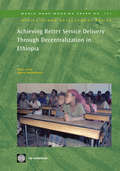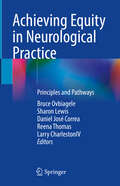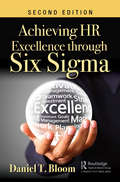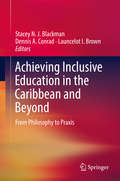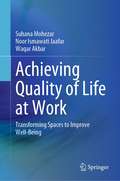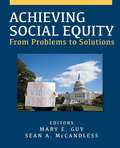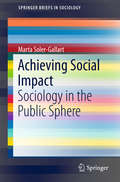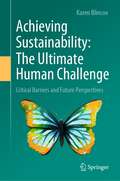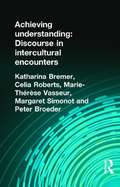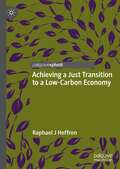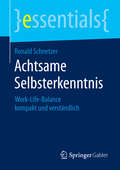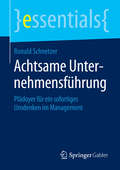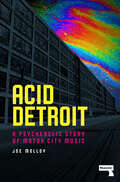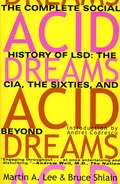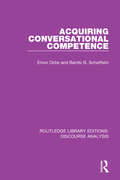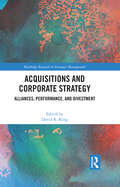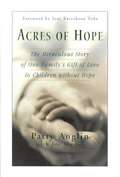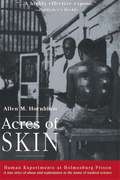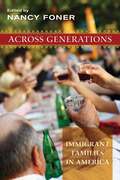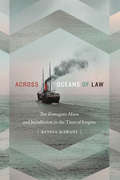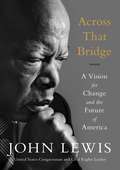- Table View
- List View
Achieving Better Service Delivery Through Decentralization in Ethiopia
by Andrew Sunil Rajkumar Marito GarciaAchieving Better Service Delivery Through Decentralization in Ethiopia examines the role decentralization has played in the improvement of human development indicators in Ethiopia. Ethiopia has made major strides in improving its human development indicators in the past 15 years, achieving significant increases in the coverage of basic education and health services in a short period of time. Improvements took place during a period of massive decentralization of fiscal resources, to the regions in 1994 and to woredas in 2002-03. The devolution of power and resources from the federal and regional governments to woredas appears to have improved the delivery of basic services. Surveys of beneficiaries reveal that they perceive that service coverage and quality have improved. Beneficiary satisfaction has increased markedly in education, and less conspicuously in water and health services. In the south, the decentralization to woredas in 2002-03 tended to narrow differences in per capita expenditures on education and health across woredas. Decentralization disproportionately favored woredas that are remote (more than 50 kilometers from a zonal capital), food-insecure, and pastoral, suggesting that decentralization has been pro-poor. Decentralization also narrowed the gap in educational outcomes between disadvantage and better-off woredas, especially in the south. Pastoral, food-insecure, and remote woredas gained in terms of the educational outcomes examined (gross enrollment rates, grade 8 examination pass rates, repetition rates, pupil-teacher ratios, and teacher-section ratios).
Achieving Equity in Neurological Practice: Principles and Pathways
by Bruce Ovbiagele Sharon Lewis Daniel José Correa Reena Thomas Larry Charleston IvThe recent high-profile murders of George Floyd, and other African American individuals, along with the prevailing coronavirus disease (COVID-19) pandemic have reinforced the notion that certain marginalized populations have worse health outcomes than other populations, likely due to unequal and unjust policies and practices. Neurological processes and prognoses frequently vary by sex/gender, race/ethnicity, socioeconomic status, and geographic location. In particular, individuals of lower socioeconomic status and from minority racial and ethnic backgrounds have worse neurological health and often receive a lower standard of neurological care. These inequities in neurological outcomes are attributed to wider societal social influences, which impact how people live and how neurology is practiced. Published evidence suggests that healthcare providers and the healthcare system contribute to inequities in neurological care for vulnerable and underserved populations. However, educating neurology care providers about these issues and training them to provide equitable care for these patients can potentially improve neurology care access, delivery, and outcomes. In this book we provide the theoretical background, scientific evidence, and experiential knowledge warranted to properly care for vulnerable, underserved patients with neurological diseases at the levels of the provider and system. This book examines the root causes of neurological health inequities across a broad range of topics and offers possible solutions for achieving neurological health equity. Initial chapters help to frame the overall issue of neurological health equity. Subsequent chapters evaluate neurological health equity from the clinical practice standpoint, with a focus on select populations and subspecialty care delivery settings. Lastly, we discuss the bigger picture with regard to the pipeline of practitioners and purview of policy makers. This text is relevant for neurology residents and fellows, multidisciplinary neurological care practitioners (neurologists, neurosurgeons, advanced practice providers, hospitalists, emergency physicians, critical care physicians, pharmacists, and allied health personnel), and public health researchers and health policy makers. The book is divided into three sections: Principles, Neurological Conditions, and Priorities. The first section establishes the framework and explains various key terminologies and concepts, which undergird the care of vulnerable and undeserved patient populations. The second section, Neurological Conditions, covers key neurological diseases by sub-specialty describing published evidence of care and outcome disparities, gaps in knowledge, practical techniques for bridging these disparities on provider and system levels. The third section, Priorities, identifies important areas of focus and improvement targeting trainees, researchers, community partners, stakeholder organizations and policy makers, which would be crucial for implementing sustained societal-level enhancements in the neurological health of these vulnerable populations.
Achieving HR Excellence through Six Sigma
by Daniel T. BloomAlthough world-class firms like GE and Motorola have relied on Six Sigma to build their performance cultures, these processes are all too often left out of human resources (HR) functions. This lack of Six Sigma principles is even more surprising because preventing errors and improving productivity are so critical to the people management processes of hiring, retention, appraisal, and development. From the history and evolution of the Total Quality movement to initiatives for introducing a Six Sigma continuous process improvement strategy in your HR department, Achieving HR Excellence through Six Sigma, Second Edition introduces a new way to envision your role within the organization. It explains how this powerful methodology works and supplies a roadmap to help you find and eliminate waste in your HR processes. Describing exactly what HR excellence means, the book outlines dozens of proven approaches as well as a hierarchy of the exact steps required to achieve it. It illustrates the Six Sigma methodology from the creation of a project to its successful completion. At each stage, it describes the specific tools currently available and provides examples of organizations that have used Six Sigma within HR to improve their organizations. The text presents proven approaches that can help you solve and even eliminate people management problems altogether. Filled with real-world examples, it demonstrates how to implement Six Sigma into the transformational side of your organization. It also includes a listing of additional resources to help you along your Six Sigma journey. Explaining how to build a new business model for your HR organization, the book supplies the new perspective and broad view you will need to discover and recommend game-changing alternatives to traditional HR approaches in your organization. The first edition of this book was one of the first to demonstrate how HR professionals could enhance their careers by learning the language of business — it introduced the evolution of change management and the change management toolbox in a fashion that could easily be implemented in organizations. This new edition updates the first with added information on some of the early history and introduces new case study tools resulting from the author’s continuing work with organizations and in academic environments.
Achieving Inclusive Education in the Caribbean and Beyond: From Philosophy to Praxis
by Dennis A. Conrad Launcelot I. Brown Stacey N. BlackmanThis book offers an international perspective of philosophical, conceptual and praxis-oriented issues that impinge on achieving education for all students. It sheds light on the historical, systemic, structural, organizational, and attitudinal barriers that continue to be antithetical to the philosophy and practice of inclusive education within the Caribbean. The first section of the book examines how globalized views of inclusion informed by philosophical ideas from the North have influenced and continue to influence the equity in education agenda in the region. The second section considers how exclusion and marginalization still occur across selected Caribbean islands. It provides both quantitative and qualitative data about the nature and experience of exclusion in selected Caribbean islands, the UK and USA. The third section tackles the practical realities of transforming education systems in the Caribbean for inclusion. In particular, it identifies teacher practices as the main site of interrogation that needs to be tackled if inclusion is to be successful. The fourth and final section examines the contribution of principals and exemplars to the development and advocacy for inclusive education. It discusses how educational leadership is understood, as well as the role of school principals in making inclusion a reality in schools, the challenges experienced and the qualities of education leaders.
Achieving Quality of Life at Work: Transforming Spaces to Improve Well-Being
by Suhana Mohezar Noor Ismawati Jaafar Waqar AkbarThis book provides an understanding and imaging of how a stress-free workplace might be designed and implemented in the context of the ‘new normal.’ Statistics show that more and more people are experiencing an increase in work-related stress, and its impact on individual psychology and well-being as well as organizational performance can be devastating. Globally, the most recent data on work-related illnesses account for 2.4 million deaths. Against this backdrop, and taking stock of how the pandemic is affecting the workplace and employee well-being, this book proposes transformations in work spaces, from implementing effective “greening” features, to more efficient technology-supported spaces. It establishes links between workplace design and creativity, happiness and productivity, confronting related issues such as generation gaps, digital interruptions, collaborative work environments and sustainability, and their respective connections with workspace environment and well-being. The book situates this discussion within a broader discussion on work and quality of life. Furthermore, the book demonstrates how several sustainable development goals might be achieved through transformed work spaces. Through an intersection between organizational psychology, well-being and quality of life studies, sociology, human resources, and ergonomics, this book is a timely examination of work-related stress in relation to work spaces that require rethinking and transformation in the throes, and wake, of the pandemic.
Achieving Social Equity: From Problems to Solutions
by Mary E. Guy Sean E. MccandlassSocial equity - While a pillar of the field alongside efficiency, economy, and effectiveness, it is one of the least understood concepts in public administration. It refers to the need for public services to be fair for all in terms of access, processes, quality, and outcomes. Whether in classrooms or in the field, we often ask "What does fairness mean in X circumstance?" or "Who decides what is fair?" or "Beyond understanding problems of social equity, what are promising solutions?" This book's purpose is to teach public service professionals how to address these questions. The book provides foundational knowledge for the institutionalization of social equity in all aspects of public service endeavors. Prepared for instructors who want to provide coverage of social equity in their courses, it is written for students who care about public service and want to learn how to apply a social equity lens throughout their careers.
Achieving Social Impact: Sociology in the Public Sphere (SpringerBriefs in Sociology)
by Marta Soler-GallartThis book presents the findings of research projects conducted by CREA (Community of Researchers on Excellence for all), a research community based in Barcelona, showing how social transformation combines scientific excellence with the political and social impact of the research. Analyzing the impact of pursuing social sciences research by providing examples of achievements and opportunities despite barriers and obstacles encountered along the way, it is of interest for a broad spectrum of scholars from the field of social sciences - particularly public sociology - as well as from other sciences such as biology and neuroscience.
Achieving Sustainability: Critical Barriers and Future Perspectives
by Karen BlincoeThe book provides an assessment of whether sustainability is realizable in the current societal framework. What are the challenges and the barriers - and what are the levers necessary to meet and overcome them?Through a revision of the essence of sustainability the book provides an opportunity to understand the deeper level of the radical change that sustainability represents, and the resistance that is preventing its realization.To build the argument the sustainable development model is compared with current development theories as well as alternative solutions based on utopian models of the past. The book assesses the results that can be achieved within the current systemic framework, based on case stories. It outlines the limitations to sustainability, pointing out and defining the multiple, cross-sectoral and systemic barriers that hinder the transition.Finally, the book offers perspectives on achieving a sustainable future, encompassing the impacts from recent events including the pandemic as well as the multiple mitigation and transition initiatives undertaken globally.Brian Goodwin's QuoteLike the caterpillar that wraps itself up in its silken swaddling bands prior to its metamorphosis into a butterfly, we have wrapped ourselves in a tangled skin from which we can emerge only by going through a similarly dramatic transformation.
Achieving Sustainable Workplace Wellbeing (Aligning Perspectives On Health, Safety And Well-being Ser.)
by David Watson Kevin Daniels Olga Tregaskis Rachel NayaniIn this groundbreaking interdisciplinary work, the authors focus on organizational analysis to understand workplace wellbeing, deviating from previous research that mostly looks at the individual worker or intervention. In addressing the question of why workplace health and wellbeing practices initiatives fall short of delivering sustained improvements in worker wellbeing, this book moves beyond localized explanations of the failure of specific interventions. Instead, it creates theoretical frameworks that explain how wellbeing at work can be improved and sustained. The authors use evidence from systematic and comprehensive surveys of the literature as well as new empirical research, and present an explanatory framework of the processes through which organizations change to implement and accommodate workplace health and wellbeing practices. Learning, adaptation and continuation explain successful implementation of workplace health and wellbeing practices, while Gestalting, fracturing and grafting explain how organizations resolve or negotiate conflict between health and wellbeing practices and existing organizational procedures, systems and practices. In addition, the authors reflect on the implications for research of reframing the unit of analysis as the organization and how studies on workplace wellbeing practices can provide a conceptual platform for thinking about the way organizations can create social value in a broader sense. This book, authored by experts in their field, is a great resource for academics and professionals of organizational studies and of worker wellbeing across the social sciences, behavioural sciences, business and management courses, wellbeing research, and labour studies.
Achieving Understanding: Discourse in Intercultural Encounters
by Celia Roberts Katharina Bremer Marie-Therese Vasseur Margaret Simnot Peter BroederThis is a detailed study of understanding in a second language, related to the actual lives of minority workers. The focus is on everyday interactions between these workers and the bureaucrats of the society in which they are now resident. It provides an important contribution to the debate about the function of language as a social practice, adding a new perspective to the psycholinguistic and experimental paradigms, currently existing in second language acquisition research.
Achieving a Just Transition to a Low-Carbon Economy
by Raphael J HeffronThe ambition of most countries across the world is to develop a low-carbon economy, evidenced by the fact that the vast majority of countries have signed the Paris COP21 agreement. This book contends that this global societal transition to a low-carbon economy must be just. As such, it will be an invaluable and accessible reference for scholars from all research disciplines who aim in their research to see a fairer, more equitable and inclusive world where sustainability is at the fore and climate targets are achieved.This is the first in-depth and original analysis to explore the central importance of law in achieving a just transition to a low-carbon economy. In addition, it advances the JUST framework, a unique framework for assessing the just transition. This important research and theoretical tool provides a practical perspective as it ensures the geographical space and timelines of development are factored into analysis. The research also provides analysis on the just transition movement around the world and the influence of international institutions.Through several case studies on Just Transition Commissions and Critical Mineral Development, the book details and demonstrates key elements of justice, including distributive, procedural, restorative, recognition, and cosmopolitan justice. It is clear from the analysis that while these are vast areas for analysis, if applied in practice, they all centrally contribute to ensuring society will advance in achieving a just transition to a low-carbon economy.
Achtsame Selbsterkenntnis: Work-Life-Balance kompakt und verständlich (essentials)
by Ronald SchnetzerImmer mehr Menschen verbringen die besten Jahre ihres Lebens mit einem Job, den sie nicht mögen, um immer mehr Dinge zu kaufen, die sie nicht brauchen, um einen Lebensstil zu führen, den sie nicht genießen. Tatsachen, die bei manchen Zeitgenossen stilles Kopfnicken auslösen. Doch anstatt zu handeln, geht man zur Tagesordnung über und verschreibt sich dem Prinzip Hoffnung: ,,Irgendwann wird's schon besser. " Doch weit gefehlt! Ronald Schnetzer beleuchtet das Thema aus einem neuen Blickwinkel. Er zeigt, wie Selbsterkenntnis mit Work-Life-Balance zusammenhängt und sich privat und geschäftlich positiv auswirkt. Anhand von prägnanten Beispielen und eindrücklichen Erlebnisberichten zeigt er, wie man Achtsame Selbsterkenntnis umsetzt, um damit glücksfähiger zu werden.
Achtsame Unternehmensführung: Plädoyer für ein sofortiges Umdenken im Management (essentials)
by Ronald SchnetzerKeine andere Betätigung bietet so viele Chancen, unseren Mitmenschen zu Lernprozessen und innerem Wachstum zu verhelfen, wie eine ganzheitlich verstandene Achtsame Unternehmensführung. Ronald Schnetzer gibt kompakt und verständlich Erfahrungen und Erkenntnisse aus über 20 Jahren Beratung, Coaching und Training im Bereich Prozessmanagement weiter. Er zeigt, wie Unternehmensführung, Prozessmanagement, Selbsterkenntnis, Burnout-Prävention und Work-Life-Balance zusammenhängen. Anhand von nachvollziehbaren Schritten und Beispielen wird gezeigt, wie Achtsame Unternehmensführung insbesondere mittels Achtsamen Prozessmanagements in Unternehmen umgesetzt wird, um mit leistungsfähigeren und zufriedeneren Führungskräften und Mitarbeitendennachhaltigen Erfolg zu erzielen.
Acid Detroit: A Psychedelic Story of Motor City Music
by Joe MolloyAcid Detroit tells the story of Motor City through its revolutionary music past and present, in order to find the seeds of radical transformation among its ruins.Acid Detroit is an exhilarating, technicolour view of Detroit&’s musical and social history from the 1960s to the present day. Redefining the counterculture as a time of Acid Communism, Acid Detroit diverges from most books on the Sixties, which centre on California, to show that Detroit was an unequalled hotbed of radical activism, urban unrest and sonic innovation. Considering Detroit's unique mix of people and cultures and enduring sonic legacies, it covers everything from incendiary garage rock, to European-influenced techno and experimental hip-hop crews, intertwining the artist&’s lives and works with the city&’s rise and decline, from its establishment as an industrial powerhouse to the high point of Motor City, into its decline and tentative rebirth. A mind-expanding tour through time and space that explores the lost possibilities, histories and hidden potentials of the city, Acid Detroit reveals a history of resilience and transformation hidden in the shadows of the abandoned factories and warehouses of the Motor City.
Acid Dreams: The CIA, the Sixties, and Beyond
by Martin A. Lee Bruce ShlainMartin Lee and Bruce Shlain's exhaustively researched and astonishing account -- part of it gleaned from secret government files -- tells how the CIA became obsessed with LSD as an espionage weapon during the early l950s and launched a massive covert research program, in which countless unwitting citizens were used as guinea pigs. Though the CIA was intent on keeping the drug to itself, it ultimately couldn't prevent it from spreading into the popular culture; here LSD had a profound impact and helped spawn a political and social upheaval that changed the face of America.
Acknowledging, Supporting and Empowering Workplace Bullying Victims: A Proactive Approach for Human Resource Managers (SpringerBriefs in Psychology)
by Jillian Williamson YarbroughThis book identifies potential support for workplace victimization through an examination of employee’s needs and needs-based motivation theories. Based on contemporary research in victimology and long-standing needs-based theories, it outlines how workplace bullying victims’ needs can be identified and how victims of workplace harassment can be empowered through the development and attainment of their unmet needs.The volume will be of interest to practitioners at the intersection of organizational and forensic psychology practitioners examining lacking needs as motivators for workplace bullying or harassment.
Acquired Tastes
by Peter MayleInternationally bestselling author of A Year in Provence, Mayle comes out with a new bestseller about the true pleasure of fine living.
Acquiring conversational competence (RLE: Discourse Analysis)
by Elinor Ochs Bambi B. SchieffelinFirst published in 1983, this book represents a substantial body of detailed research on children’s language and communication, and more generally on the nature of interactive spoken discourse. It looks at areas of competence often examined in young children’s speech have that have not been described for adults — leading to insights not only in the character of adult conversation but also the process of acquiring this competence. The authors set forward strategies for conversing at different stage of life, while also relating these strategies to, and formulating hypotheses concerning, the dynamics of language variation and change.
Acquisition and Analysis of Terrestrial Gravity Data
by Leland Timothy Long Ronald Douglas KaufmannGravity surveys have a huge range of applications, indicating density variations in the subsurface and identifying man-made structures, local changes of rock type or even deep-seated structures at the crust/mantle boundary. This important one-stop book combines an introductory manual of practical procedures with a full explanation of analysis techniques, enabling students, geophysicists, geologists and engineers to understand the methodology, applications and limitations of a gravity survey. Filled with examples from a wide variety of acquisition problems, the book instructs students in avoiding common mistakes and misconceptions. It explores the increasing near-surface geophysical applications being opened up by improvements in instrumentation and provides more advance-level material as a useful introduction to potential theory. This is a key text for graduate students of geophysics and for professionals using gravity surveys, from civil engineers and archaeologists to oil and mineral prospectors and geophysicists seeking to learn more about the Earth's deep interior.
Acquisitions and Corporate Strategy: Alliances, Performance, and Divestment (Routledge Research in Strategic Management)
by David R. KingCorporate restructuring (acquisitions, alliances and divestment) is a visible form of corporate strategy. For example, firm investments in buying and selling assets exceed the gross domestic product of the majority of nations. Most research in this area examines acquisitions, but informing practice is limited by examining acquisitions in isolation or using a narrow focus. For example, a lingering problem is that average acquisition performance is consistently around zero, suggesting a need to identify practically relevant relationships. In addressing this need, research on three fundamental questions is covered: 1) How do acquisitions relate to other corporate strategy options?; 2) What helps to predict acquisition performance?; and 3) What are persistent acquisition research issues? The first question is intended to overcome a research limitation that acquisitions are often examined independent of other corporate strategies, including internal development, alliances, and divestment. The second question addresses novel relationships associated with the primary focus of acquisition research in examining what drives acquisition performance. The third question reflects on the underlying complexity of the phenomenon that makes it a challenge to identify what drives acquisition performance. Overall, the intent of presenting ideas on these fundamental questions is to illustrate promising areas for future research. This book presents the latest state of knowledge on the topic and will be of interest to researchers, academics, and advanced students in the fields of strategic management, international business, and organizational studies.
Acres of Hope: The Miraculous Story of One Family's Gift of Love to Children Without Hope
by Joe Musser Patty AnglinBack Cover: Over the past several years, Patty and Harold Anglin have adopted eight children with special needs, adding to their already large family of seven biological children. Their adopted children range in age from six months to fifteen years. They come from all over the world, from as far away as Nigeria and India. They are children who would have had no hope in this world if Patty and Harold had not opened their hearts and given them a home bursting with love and acceptance. Many people have asked Patty and Harold why they have adopted so many children with special needs. Their answer is simple, "There is a need!" Years ago, God gave them the verse, "And whoever receives one little child like this in My name receives Me" (Matthew 18:5). God has brought each miracle child into the Anglin home in a special way. They simply responded to the call. Patty says, "Our wish is that every innocent child will come to know and feel the love and security of a family. We believe if you are faithful and obedient servants of God, He will supply all your needs. We know this to be true; He has never let us down!"
Acres of Skin: Human Experiments at Holmesburg Prison
by Allen M. HornblumAt a time of increased interest and renewed shock over the Tuskegee syphilis experiments, Acres of Skin sheds light on yet another dark episode of American medical history. In this disturbing expose, Allen M. Hornblum tells the story of Philadelphia's Holmesburg Prison.
Across Generations: Immigrant Families in America
by Nancy FonerImmigrants and their American-born children represent about one quarter of the United States population. Drawing on rich, in-depth ethnographic research, the fascinating case studies in Across Generations examine the intricacies of relations between the generations in a broad range of immigrant groups—from Latin America, Asia, the Caribbean, and Africa—and give a sense of what everyday life is like in immigrant families.Moving beyond the cliché of the children of immigrants engaging in pitched battles against tradition-bound parents from the old country, these vivid essays offer a nuanced view that brings out the ties that bind the generations as well as the tensions that divide them. Tackling key issues like parental discipline, marriage choices, educational and occupational expectations, legal status, and transnational family ties, Across Generations brings crucial insights to our understanding of the United States as a nation of immigrants.Contributors: Leisy Abrego, JoAnn D’Alisera, Joanna Dreby, Yen Le Espiritu, Greta Gilbertson, Nazli Kibria, Cecilia Menjívar, Jennifer E. Sykes, Mary C. Waters, and Min Zhou.
Across Oceans of Law: The Komagata Maru and Jurisdiction in the Time of Empire (Global and Insurgent Legalities)
by Renisa MawaniIn 1914 the British-built and Japanese-owned steamship Komagata Maru left Hong Kong for Vancouver carrying 376 Punjabi migrants. Chartered by railway contractor and purported rubber planter Gurdit Singh, the ship and its passengers were denied entry into Canada and two months later were deported to Calcutta. In Across Oceans of Law Renisa Mawani retells this well-known story of the Komagata Maru. Drawing on "oceans as method"—a mode of thinking and writing that repositions land and sea—Mawani examines the historical and conceptual stakes of situating histories of Indian migration within maritime worlds. Through close readings of the ship, the manifest, the trial, and the anticolonial writings of Singh and others, Mawani argues that the Komagata Maru's landing raised urgent questions regarding the jurisdictional tensions between the common law and admiralty law, and, ultimately, the legal status of the sea. By following the movements of a single ship and bringing oceans into sharper view, Mawani traces British imperial power through racial, temporal, and legal contests and offers a novel method of writing colonial legal history.
Across That Bridge: Life Lessons and a Vision for Change
by John LewisWinner of the NAACP Image Award for Outstanding Literary Work/Biography -- in paperback for the first time.In turbulent times Americans look to the Civil Rights Movement as the apotheosis of political expression. As we confront questions of social inequality there's no better time to revisit the lessons of the '60s and no better leader to learn from than Congressman John Lewis.In Across That Bridge, Congressman Lewis draws from his experience as a leader of the Civil Rights Movement to offer timeless guidance to anyone seeking to live virtuously and transform the world. His wisdom, poignant recollections, and powerful ideas will inspire a new generation to usher in a freer, more peaceful society. The Civil Rights Movement gave rise to the protest culture we know today, and the experiences of leaders like Congressman Lewis have never been more relevant. Now featuring an updated introduction from the author addressing the current administration, Across that Bridge offers a strong and moral voice to guide our nation through an era of great uncertainty."The most important lesson I have learned in the fifty years I have spent working toward the building of a better world is that the true work of social transformation starts within. It begins inside your own heart and mind, because the battleground of human transformation is really, more than any other thing, the struggle within the human consciousness to believe and accept what is true. Thus to truly revolutionize our society, we must first revolutionize ourselves. We must be the change we seek if we are to effectively demand transformation from others." ---John Lewis in Across That Bridge
